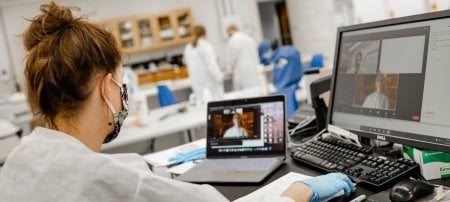She stood at the edge of the field, the outside left corner. The grass, her teammates, her opponents—and the state championship—spread out before her. She knew before she stepped in for the free kick that it wasn’t right. The soccer ball hit the upper right corner of the crossbar. The goalie was wearing yellow. Her jersey was maroon.
The grass was bright green. She stood at the outside left corner. She knew she shanked
the kick. Upper right corner. The goalie wore yellow.
Maroon. State championship. Bad kick.

Jess Splittgerber has replayed this scene in her head more times than she can count. Now a captain and midfielder on Michigan Tech’s soccer team, Splittgerber says after that high school game, she kept missing kicks. Again and again, the scene and her frustration from the state championship kept kicking around in her head.
Many think athletics is a show of pure physical prowess. But athletes, their coaches, and trainers know sports are as much a mental game as a physical one. Likewise, the rest of life—from calculating taxes, to sending emails, to presenting in public—is physical as well as mental, but humans are good at ignoring this mind-body connection. That’s why women’s soccer coach Michelle Jacob asked her team this past fall to start meditating and doing yoga during practice and before games.
“I’m not going to lie, before we started doing mindfulness exercises, I was pretty skeptical that there would be any real benefit,” says Kat Farkas, a midfielder and teammate of Splittgerber. “To my surprise, I have noticed that while practicing mindfulness, my mind was able to achieve a restful state—something difficult for a college athlete with a hundred things on her mind.”
Mindfulness is a skill the rest of us could stand to learn, too. From gaining clarity of mind to improving circulation to sleeping better, learning how to stay present and attentive in the moment is backed by science.

“You don’t have to go to a yoga class to feel the effect of taking a deep breath,” says Brigitte Morin, a lecturer of biology who teaches anatomy, lab science, and a class called Biology of Movement and Meditation. She’s also a yoga instructor and worked with Farkas, Splittgerber, and their teammates on regular meditations and restorative yoga. “There’s physiology at work,” Morin says. “You’re stretching your lungs, activating a nerve, which tells your brain, ‘hey, this is happening,’ and then your brain responds parasympathetically by secreting hormones that relax you.”
The body’s parasympathetic nervous system helps regulate a cool, calm, and collected demeanor; the body’s fight-or-flight response is the sympathetic nervous system. It’s great for escaping tigers, thinking quickly during car accidents, or catching a pen that rolls off the table. It responds in the same way, however, to snarky emails and traffic jams.
“Our brains problem-solve—it’s what they do—and they’re good at it,” Morin says.
Too good. So good they start making up problems to solve—dwelling on past moments or projecting future ones. In fact, when confronted with a problem, like Splittgerber’s missed kick, the brain shuffles through every single related scenario, both real and imagined, then replays the sorry contents again and again looking for a way to fix the problem. The process happens instantaneously; most people don’t even realize it.
"You don't have to go to a yoga class to feel the effect of taking a deep breath . . ."
Brains can be retrained, though. Specifically, mindfulness makes the unconscious conscious by owning what’s happening emotionally and mentally right now. The key is not ignoring or disparaging thoughts and emotions, rather it’s acknowledging them and not distorting them by stuffing them down, criticizing, or overanalyzing. Mindfulness is like exercising mental muscles, strengthening the ability to refocus on a specific task when the brain leaps around looking for the path of least resistance. Stillness and meditation are the mind’s gym; nonjudgment and letting go are good mental form. For centerback Emily Morin, the mental workout helped outside soccer, especially during busy times like preparing for Design Expo or taking tests during Career Fair.
“We’re just juggling so much, and it’s hard thinking, well, this exam didn’t go so well, what if the interview doesn’t go well?” she says. “But in my mind, those thoughts compartmentalize, and it’s easier to say, okay, that’s done and I don’t need to worry about that.”

Sometimes we miss a kick or two. Our brains try hard to prevent it from happening again but worry makes us suffer twice (or a thousand times) more than we need to. Mindfulness gets us out of our heads and back on the field, which is how Splittgerber found her own way to deal with missed kicks.
“I went back to saying a phrase every time before I’d kick—I’d mentally prepare myself just like I would when meditating,” she says. “And I’d say, ‘This ball. This is the one.’ And that was it. There was no other ball, I was going to hit this one.”
Michigan Technological University is an R1 public research university founded in 1885 in Houghton, and is home to nearly 7,500 students from more than 60 countries around the world. Consistently ranked among the best universities in the country for return on investment, Michigan's flagship technological university offers more than 120 undergraduate and graduate degree programs in science and technology, engineering, computing, forestry, business, health professions, humanities, mathematics, social sciences, and the arts. The rural campus is situated just miles from Lake Superior in Michigan's Upper Peninsula, offering year-round opportunities for outdoor adventure.




